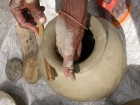UNESCO’s Cultural Conventions ratified by the National Parliament of Timor-Leste

On June 15th, 2015, the National Parliament of Timor-Leste adopted unanimously the ratification of three UNESCO’s cultural conventions: the Convention Concerning the Protection of the World Cultural and Natural Heritage, 1972; the Convention for the Safeguarding of the Intangible Cultural Heritage, 2003; and the Convention on the Protection and Promotion of the Diversity of Cultural Expressions, 2005.
This parliamentary initiative follows the approval, in October 2014, of three Government Resolutions proposing precisely the ratification of these important international mechanisms for the management of cultural heritage. In fact, the Programme of the Sixth Government defines a set of priorities in the area of Arts and Culture for the legislative period between 2015 and 2017. The protection, management and promotion of Timor-Leste’s cultural heritage are among the priority programmes of this Executive, given its importance in the affirmation of the national identity and its potential for the development of cultural based tourism.
Purpose of the conventions
The ratification of the three UNESCO’s conventions opens the possibility of projecting the protection of the Timorese cultural heritage to an international level.

The Convention Concerning the Protection of the World Cultural and Natural Heritage, allows for the classification of cultural heritage sites and its worldwide recognition. Timor-Leste will be able to count on human resources and financial support from the World Heritage Committee of that body of the United Nations. In addition, the classification of sites as World Heritage acts as an incentive to attract tourism, encouraging the creation of jobs and the production of wealth.
 The UNESCO Convention of 2003 defines as Intangible Cultural Heritage “the practices, representations, expressions, knowledge, skills – as well as the instruments, objects, artefacts and cultural spaces associated therewith – that communities, groups and, in some cases, individuals recognize as part of their cultural heritage." Through the ratification of this convention, Timor-Leste will be able to count on technical and financial support from UNESCO, to better safeguard its traditional cultural expressions and prepare a list of national goods and values with potential to be classified as Intangible Cultural Heritage.
The UNESCO Convention of 2003 defines as Intangible Cultural Heritage “the practices, representations, expressions, knowledge, skills – as well as the instruments, objects, artefacts and cultural spaces associated therewith – that communities, groups and, in some cases, individuals recognize as part of their cultural heritage." Through the ratification of this convention, Timor-Leste will be able to count on technical and financial support from UNESCO, to better safeguard its traditional cultural expressions and prepare a list of national goods and values with potential to be classified as Intangible Cultural Heritage.
Likewise, the ratification of the Convention on the Protection and Promotion of the Diversity of Cultural Expressions expresses the willingness of the country to protect and promote its own cultural diversity, as a key element of sovereignty, stability and national identity, and makes culture a transversal element to a sustainable development. The ratification of this convention shall be binding on the State of Timor-Leste to promote the production, access and enjoyment of culture. To achieve this, it must support traditional activities, artists and cultural creative industries. By ratifying this convention, Timor-Leste will be able access the International Fund for Cultural Diversity, as well as international technical assistance in this area.
willingness of the country to protect and promote its own cultural diversity, as a key element of sovereignty, stability and national identity, and makes culture a transversal element to a sustainable development. The ratification of this convention shall be binding on the State of Timor-Leste to promote the production, access and enjoyment of culture. To achieve this, it must support traditional activities, artists and cultural creative industries. By ratifying this convention, Timor-Leste will be able access the International Fund for Cultural Diversity, as well as international technical assistance in this area.
Promote the National Culture
Over the last few years, the State Secretariat for Arts and Culture has worked in close collaboration with the UNESCO Office in Jakarta in order to identify, safeguard and promote the rich cultural heritage of Timor-Leste. In addition to training sessions, important activities for cultural promotion were also developed, such as the editing and printing of publications, brochures and movies in DVD, as well as the production of cultural festivals.
 In addition, the State Secretariat, in the context of the assigned powers regarding the management of the country’s cultural heritage, has been identifying and studying the sites, expressions and values of the cultural heritage of Timor-Leste. These results have been gradually entered into a national database, already set up. The new Decree-Law for Cultural Heritage is also being internally discussed, which will allow the management, classification and safeguarding of tangible (movable and immovable) and intangible cultural heritage of the country.
In addition, the State Secretariat, in the context of the assigned powers regarding the management of the country’s cultural heritage, has been identifying and studying the sites, expressions and values of the cultural heritage of Timor-Leste. These results have been gradually entered into a national database, already set up. The new Decree-Law for Cultural Heritage is also being internally discussed, which will allow the management, classification and safeguarding of tangible (movable and immovable) and intangible cultural heritage of the country.
While reinforcing its commitment to implement these international agreements, the State Secretariat for Arts and Culture continues to work on the ratification of other important UNESCO’s conventions, such as the Convention on the Means of Prohibiting and Preventing the Illicit Import, Export and Transfer of Ownership of Cultural Property, 1970, and the Convention on the Protection of the Underwater Cultural Heritage, 2001.










































